SANDY, Utah – Kyle Beckerman doesn’t want to be here.
It's a Friday in October, and I’m interviewing Beckerman in an auxiliary locker room at Rio Tinto Stadium. Just down the hall is the Real Salt Lake players’ lounge, the walls of which are adorned with life-size images of the club captain celebrating some of the proudest moments in club history.
Two days ago, on Oct. 14 against the Portland Timbers, Beckerman tied Steve Ralston’s all-time record for games played by a field player in MLS history. Tomorrow, against FC Dallas, he’ll make the mark his own. He knows the milestone comes with some attendant media responsibilities, so he’s gamely answering my questions about his career, his personality, his ideas – his life – ahead of his 379th MLS regular season game in this, his 16th year in a league that just turned 20.
Beckerman is proud of his new record, but he’d rather not talk about it – at least not now. Not two days after RSL’s seven-year playoff streak all but officially ended, with Beckerman gutting out a full 90 in the club’s 1-0 home loss to the Timbers, just four days after he played all 120 minutes in the United States national team’s CONCACAF Cup loss to Mexico.
He’d rather be relaxing at home in the foothills above downtown Salt Lake City near the Utah State Capitol, rather be training at RSL’s facility just south of Rio Tinto Stadium, rather be putting a fly in the Provo River down in Utah County. He’d rather do just about anything but talk to the media.
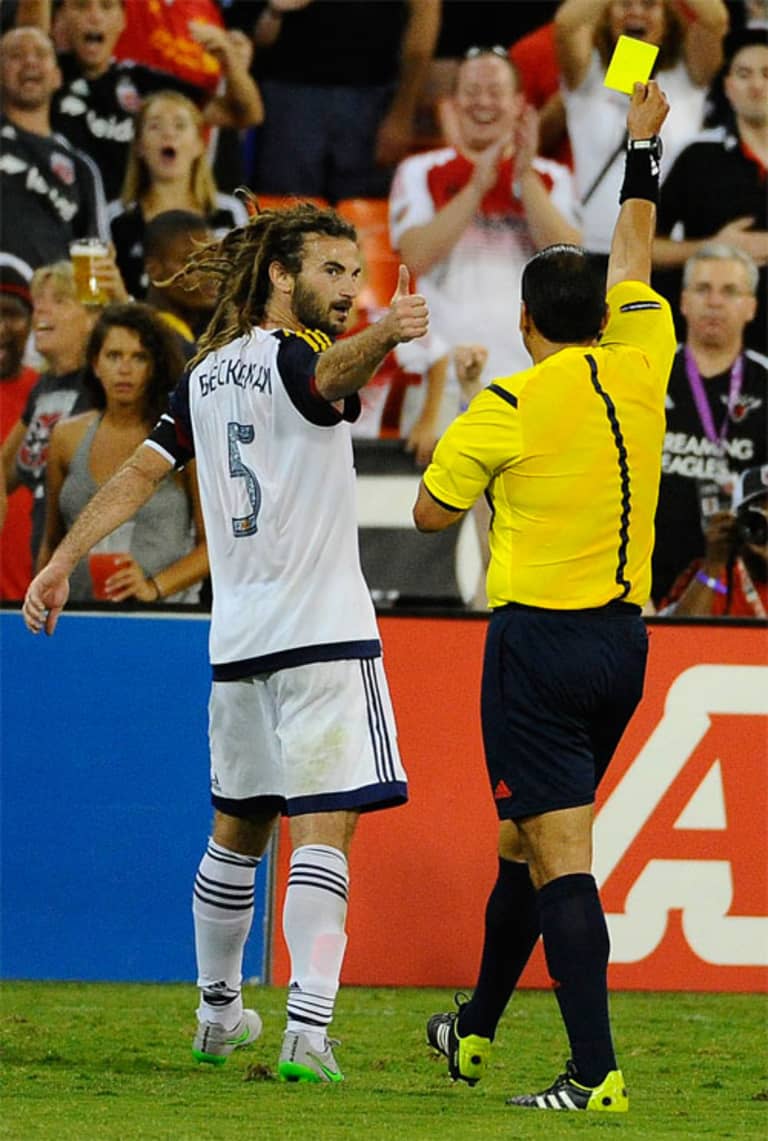
Kyle Beckerman's 379 games played are now the most in MLS history, one more than former Tampa Bay Mutiny and New England Revolution defender Steve Ralston. However, it's not Beckerman's only MLS record. He is also the all-time leader in yellow cards with 85. (USA TODAY Sports Images)
I know this, because I used to be the guy who cajoled Beckerman into giving interviews. He almost always agreed to my requests during a stint in RSL’s public relations department from July 2012 to June 2014, but he often gave me a hard time, too. Beckerman has opinions, and while he knows better than to share too many of them publicly, he isn’t so gun-shy behind closed doors.
“That interview was BS, Sam. I’m not talking to that guy again,” Kyle, after an unfortunate TV cameraman was left to ask questions when his station’s reporter didn’t show up in time for media availability.
“This is on camera? What the hell dude? I gotta know that [stuff]. My hair ain’t right, gotta go get my hat,” Kyle, before sitting down with reporters from a local newspaper, who were filming their interview on what appeared to be a 12-year-old camcorder.
“Sam, why are we tweeting about the [expletive] Denver Broncos? We’re a professional soccer team. This isn’t somebody’s personal Twitter account,” Kyle, a million times.
That’s the salty side of Beckerman. It’s the part of him that’s made some questionable tackles over the years. The part that spent 90 minutes telling an opponent “you [expletive] suck.” The part that pushes him into memory-blocking “rage blackouts” – his words – on the field. The part that challenged former RSL general manager Garth Lagerwey – a man he hasn’t exactly hid his contempt for this year – to a fight after Beckerman was ejected from a CONCACAF Champions League match in 2012.
Then, there’s the kinder, gentler side of Beckerman. The captain who is universally beloved by his teammates. The fan favorite who always has time to share a smile and a kind word with a young fan. The friend who spent one of the happiest moments of his life – the day he made the 2014 World Cup team – consoling a heartbroken Landon Donovan, his boyhood teammate. The dreadlocked star of soccer in Utah, so synonymous with Real Salt Lake that club founder Dave Checketts calls him the “personification of everything the team stands for.”
Beckerman doesn’t wholly live on those two extremes. Like the rest of us, his truth lies somewhere in the middle. But both sides – his edginess and his kindness, his ferocious competitive streak and his willingness to sacrifice – have shaped the player he’s become, taking him from small crowds at Fort Lauderdale’s Lockhart Stadium in MLS’s halcyon early 2000s to starting World Cup matches against Ghana, Portugal and Germany in Brazil last summer.
“It’s two different people,” says Nick Rimando, Beckerman’s longtime teammate with RSL, the US national team, and, once upon a time, the Miami Fusion. “He's very passionate with whatever he does, life, soccer, playing the guitar. I think soccer is his getaway where he can use his aggression and kind of let things go. When he gets in tackles maybe he's releasing something that's bothering him off the field, but you would never know that anything's bothering Kyle because everybody loves him.”
*

dlCatalogctl00_lblImageCaption">Only Brad Davis of the Houston Dynamo has been with his current club longer than Beckerman, who will enter his 10th season with Real Salt Lake in 2016. “Real Salt Lake is… it’s a part of me. It’ll be a part of my life forever,” he says. (USA TODAY Sports Images)
*
Kyle Beckerman didn’t want to be here, either.
He was 25 in July 2007 when what former RSL defender and current MLS commentator Brian Dunseth calls “the worst trade in MLS history” took him from Colorado to Utah in exchange for Mehdi Ballouchy. Beckerman had been with the Rapids for nearly five years, joining the club ahead of the 2002 season after the Miami Fusion – where he signed as an 18-year-old in 2000 following his graduation from U.S. Soccer’s first-ever Under-17 residency program in Bradenton, Florida – folded.
He’d established himself as a professional in Colorado, recovering from a gruesome broken leg suffered in 2001 to form one of the strongest midfield partnerships in the league with ex-Fusion teammate and current Rapids head coach Pablo Mastroeni. Life was good in Denver; the Rapids were consistently in the playoffs, Beckerman enjoyed the city, his national team career was beginning to take off and he was becoming part of the fabric of the club, featured on billboards alongside Mastroeni.
But he had a bit of a falling out with head coach Fernando Clavijo early in the 2007 season, and found himself on the trading block. Clavijo, now FC Dallas’ technical director, shopped Beckerman around the league, entering discussions with several teams – Donovan remembers urging then-Galaxy head coach Frank Yallop to “do whatever it took” to get Beckerman to LA – including Salt Lake.
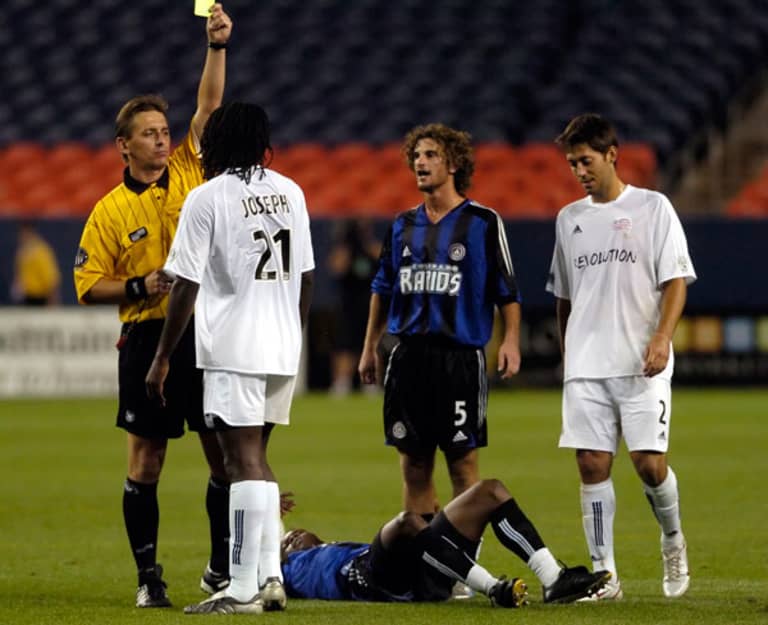
Now known for his trademark dreadlocks, it's easy to forget Beckerman was once a fresh-faced midfielder looking to break in with the Miami Fusion and Colorado Rapids. (USA TODAY Sports Images)
Clavijo, who says he had to trade either Beckerman or Mastroeni because of salary cap constraints, offered Beckerman for Ballouchy, straight-up. RSL were hesitant. Not even three years old, the club was already undergoing a huge transition after Checketts convinced Jason Kreis to end his playing career in order to replace John Ellinger as head coach in May 2007.
Ellinger, who coached Beckerman with the U-17s in Bradenton and started him in all six games of the US’s fourth-place run at the 1999 U-17 World Cup, had moved from the bench to become the club’s technical director, and he liked Ballouchy. Now with New York City FC, the Moroccan midfielder was the second-overall pick in the 2006 SuperDraft, had developed into an every game starter with RSL and, at 24, seemed destined for a solid career.
Kreis liked Ballouchy, too, but he wasn’t so high on Beckerman. He knew Beckerman had talent, but he didn’t like the way the youngster ran his mouth, a feeling that only intensified after the two exchanged words and few shoves during a 2007 preseason match between RSL and the Rapids in Las Vegas.
“He talked a lot,” Kreis says. “It was not a quality that endeared me, actually, when I thought about bringing him to the team.”
RSL were frozen. Ellinger and Kreis were considering leaving the trade on the table. Checketts, who had made his share of deals during previous stints at the helm of the NBA’s Utah Jazz and New York Knicks and NHL’s New York Rangers, was initially bullish on the proposal – he jokes that he “offered to drive Mehdi to the airport” after first receiving the offer – but had his doubts as well.
For a time, it looked like RSL would decline Clavijo’s offer, leaving a man who would eventually take the club to great heights on the other side of the Rockies. Then Checketts rang a league employee working in player development, and asked him what he thought of the proposed trade. The source, whom Checketts declined to name, told him that the deal for Beckerman was a “no-brainer.”
On Checketts’ orders, RSL pulled the trigger. In Colorado, Beckerman, who had recently signed a new contract with the Rapids, was blindsided. It wasn’t a move he was expecting, nor one he wanted to make. The Rapids had made the playoffs in all of his four seasons in Denver; RSL were 1-5-8, in last place and destined for their third-straight bottom-three finish.
Beckerman had always carried a substantial chip on his shoulder. When he was traded, that chip turned into a boulder. After struggling for playing time and going through contraction in Miami, after turning himself into an automatic starter under two different head coaches in Colorado, after finally getting a shot with the national team years after his old U-17 teammates Donovan, DaMarcus Beasley, Oguchi Onyewu and Bobby Convey broke in, Beckerman had to prove himself all over again – this time with the knowledge that a club he’d thought he was an integral part of had sent him packing to their biggest rival.
“I wasn’t too happy. …I always thought that I’d be in Colorado forever,” Beckerman says. “I just never really thought of being traded, it was just a shock.”
While he was landing in a tough situation in Salt Lake, RSL offered Beckerman something he’d never had before: A chance to make a club his own. He never had much of a shot to play for the desperate Fusion before they were contracted, and while he was certainly respected in Colorado, Beckerman labored there in the shadow of two-time World Cup vet Mastroeni. Salt Lake’s struggles were his opportunity, their turmoil his chance to become the face of a franchise.
“We were trying to find our identity, we were trying to find the pieces and little by little we were picking the right pieces. But the No. 1 piece that we picked up was Kyle,” says Rimando, who joined RSL prior to the 2007 season. “Kyle brought energy, a different attitude to the team. … He demanded a winning mentality. He demanded that in training and it led over to the pitch during games. And he's one of the guys, if not the guy, that made RSL what it is today.”
Beckerman’s always had that competitive edge. It’s innate, a wrestler’s mentality – he won a Maryland state championship as a high school freshman and his older brother, Todd, was an All-American at Nebraska and is now the head coach at Brown – transported from the mat to the field.
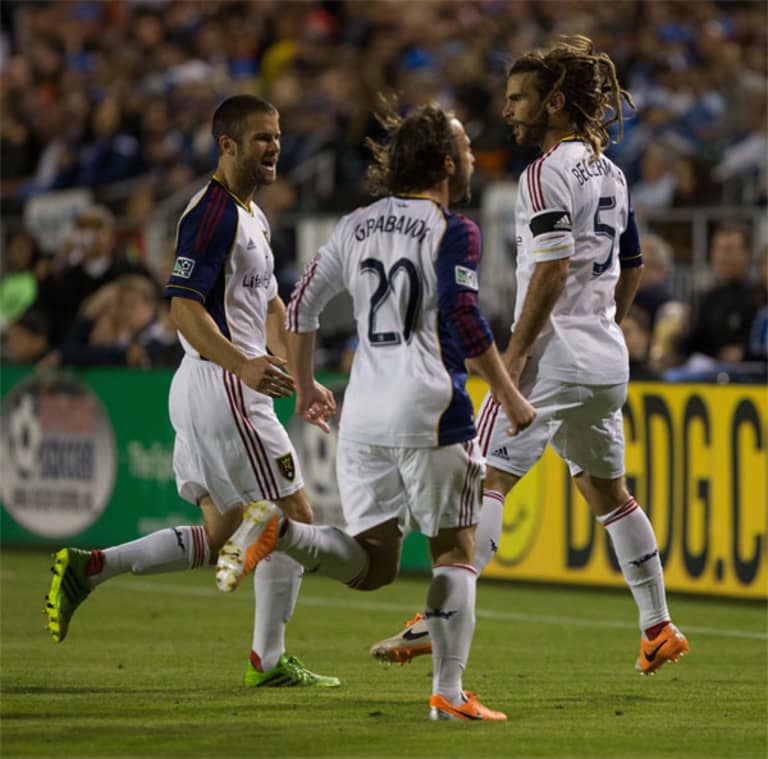
Though Beckerman isn't known as a goalscorer, he's managed to collect 36 goals during his 16-year MLS career, including seven in 2007 with the Colorado Rapids.(USA TODAY Sports Images)
Pro athletes are, by their very nature, hypercompetitive, but Beckerman’s teammates and coaches say he takes it to a different level. Most players can get up for games, but Beckerman brings the same, full bore, 100 percent passion to every training session, too.
He’s constantly looking for an edge, constantly throwing himself into tackles, constantly demanding more from himself and his teammates. He admits he can be a bit extreme. Once, before a summer road trip to Texas, Beckerman came to practice wearing long sleeves and pants. Underneath his gear were garbage bags, which he had taped to himself to better simulate the Texas humidity while training in Utah’s dry, high desert climate.
NYCFC defender Chris Wingert has seen Beckerman’s fire for the past 20 years. The two played together on regional Olympic Development Program teams starting at age 13, and were teammates in Colorado before being sent to Utah in separate trades three days apart in the summer of 2007. They lived together for a year in Salt Lake and played with each other at RSL until Wingert was picked up by Kreis and NYCFC in last year’s Expansion Draft.
Wingert, a Long Island native, would occasionally visit Beckerman and his family in Maryland in between ODP camps during high school. One summer, he and another teammate went with the Beckermans to Ocean City, Maryland. Kyle had a youth national team camp the next week, but was battling the flu. Still, prodded along by his mom, he trained, taking a day of his vacation to run sprints in the sand while sick.
“If you're going to be around pro athletes, you would think most of them are going to be working hard and have a competitive nature,” Wingert says. “And they do, but I think that there's still different levels of that, and Kyle is the upper, upper echelon.”
Beckerman’s combo of competitiveness and talent, as we now know, paid off in Salt Lake. Kreis quickly turned the team over after taking the coaching gig, adding Beckerman, Wingert, Javier Morales, Fabian Espindola and Robbie Findley during the 2007 season. They finished respectably, posting a 5-7-3 record in the 15 games after Beckerman arrived.
But RSL weren’t RSL, not yet. They played a 4-2-3-1 formation that first year, with Beckerman occupying one of the central midfield spots. He wasn’t yet playing as a pure defensive midfielder, instead lining up in the same box-to-box role he thrived in with Mastroeni in Colorado.
Kreis, current RSL head coach Jeff Cassar and the rest of the staff changed that in the winter, however, switching to the diamond midfield that the club would become known for. Beckerman slotted in at the base, with Morales playing the attacking role at the point. Tony Beltran, Nat Borchers, Will Johnson and Jamison Olave were added in the offseason, filling out the core that would have so much success in Utah.
It wasn’t always smooth – Beckerman, who saw himself as more of an attacking midfielder after scoring seven goals for the Rapids in 2006, battled with Kreis about the formation change – but it worked. The club qualified for their first-ever postseason in 2008, then reached the pinnacle in 2009, sneaking into the playoffs on the regular season’s final day before making an improbable run to MLS Cup, where they shocked Donovan, David Beckham and the Galaxy in Seattle.
RSL began to cement their status as a perennial league power in 2010, finishing second to LA in the Supporters’ Shield standings and kicking off a five-year run with at least 15 wins and 50 points. More finals were reached, with Beckerman helping RSL become the first MLS team to play in the CONCACAF Champions League final in 2011 – he missed their heartbreaking second-leg defeat to Monterrey because of yellow-card accumulation – and captaining the club to the US Open Cup and MLS Cup title games in 2013.
Beckerman became one of the steadiest players in the league from his place at the base of the diamond. Like any defensive midfield spot, it requires a little bit of nastiness, and a tremendous ability to read the game, cover ground and make tackles. Perhaps more so than in other setups, however, the defensive midfielder in the diamond is on an island. They cover the back four by themselves, and the attack often starts with them. The ability to consistently make good decisions on and off the ball is paramount; do it well, and a team can hum. Struggle, and things get out of sorts quickly.
“A huge part of why the diamond was so successful and, beyond that, why RSL in this decade has been so successful is because Kyle has been in that pivotal role,” Beltran says.
It’s up for debate whether Beckerman was RSL’s best player during this stretch. Morales was, and is, an incredible No. 10; Rimando is perhaps the best goalkeeper in MLS history; forward Alvaro Saborio bagged goals at a nearly unprecedented rate while in Salt Lake.
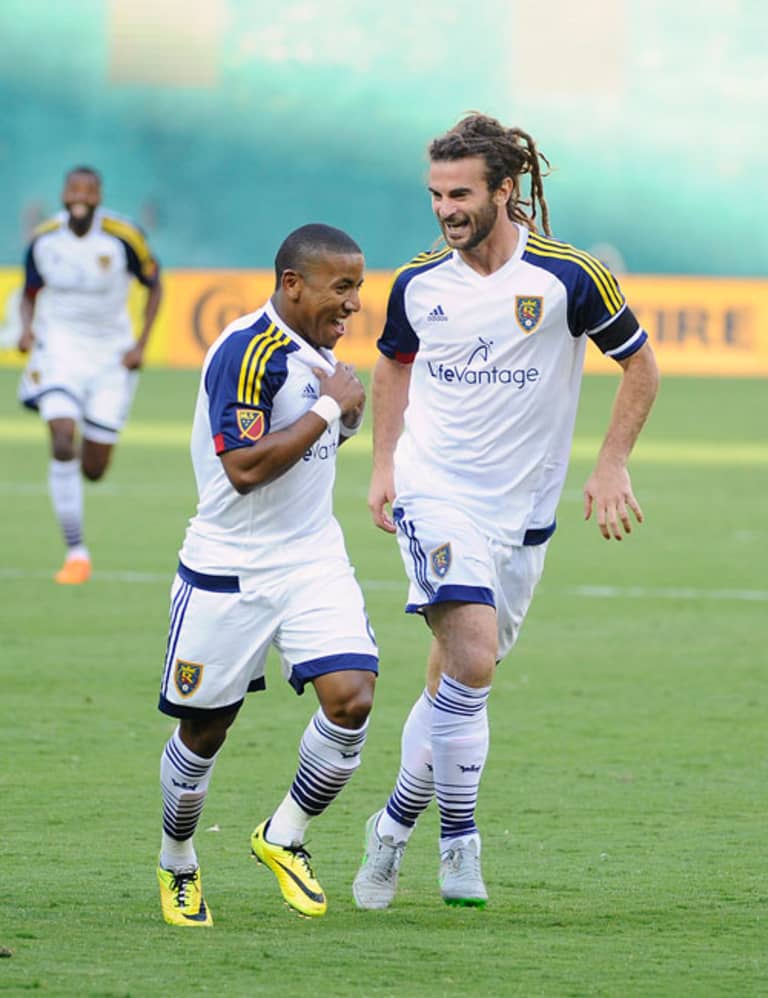
Beckerman leads by example as Real Salt Lake's captain. His competitive nature is legendary among teammates. It's in the "upper, upper echelon," says long-time teammate Chris Wingert. (USA TODAY Sports Images)
There’s no doubt, however, that Beckerman was the most important piece of the puzzle. There’s a reason why we think of Beckerman when we think of RSL, and it goes beyond the dreadlocks. He embodies the club, his us-against-the-world, underdog mentality meshing perfectly with RSL’s organizational attitude.
He’s commonly referred to by his teammates as the best captain they’ve ever had. He makes them feel welcome, but also holds them accountable. He sets an example in training, but turns down his competitiveness enough off the field to be able to bring a locker room together.
“Kyle’s never checked out. He’s always thinking about the team, always thinking about why things are happening, why things are going well or why they're not and he's never afraid to voice his opinion on what he thinks should be done,” says Beltran. “He always wants to be better, he always wants the club to be better. When you see him before a game, when you hear his words, you have no choice, it’s addicting, it’s contagious, you immediately feel his fiery emotion and passion and you want to do well so you can do well alongside of him.”
But while he was having plenty of success on the club level, Beckerman, for the longest time, couldn’t quite catch on with the US national team. He chased and chased, but previous USMNT manager Bob Bradley preferred players such as Maurice Edu, Ricardo Clark, Sacha Kljestan and Benny Feilhaber – with whom Beckerman got into a dustup at US camp in January 2014, the last time Feilhaber was called to the US, before the two traded barbs in the media earlier this year. Beckerman collected a few caps here and there, but was almost exclusively called for “B-team” camps, friendlies and tournaments.
He plays it down, but those around him say that the lack of international attention served as serious motivation. He’d proved himself on the club level, but the perpetual underdog still hadn’t gotten to the game’s highest level. The slights – and they’re viewed as slights in Utah – sustained him, allowed him to bring his signature intensity to every training session, every game, every day.
His work paid off shortly after Jurgen Klinsmann took over in the summer of 2011. Beckerman was called in to Klinsmann’s first match in charge of the USMNT that August, going the full 90 in the US’s 1-1 draw against Mexico in Philadelphia.
It was the start of a fruitful relationship. Klinsmann put his trust in Beckerman, often playing him as a lone defensive midfielder, freeing up players such as Michael Bradley, Jermaine Jones and, for a time, Donovan to focus more on attacking. Beckerman became a regular part of Klinsmann’s setup, playing a key role in many of the US’s biggest games. He went the full 90 in the US’s first-ever win in Mexico in 2012; he was a key cog when the US won the CONCACAF Gold Cup in 2013; he started the Dos a Cero in Columbus that clinched the US’s spot at the World Cup.
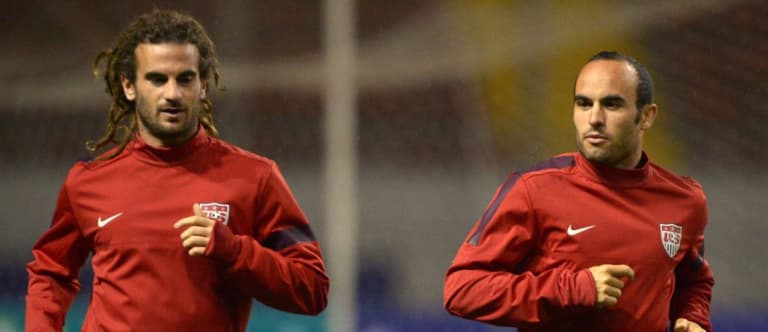
“If I’m a national team coach, I look at Kyle and I say, ‘He’s consistent and he’s a winner,’ and for me that’s so important,” says Donovan. “I think Jurgen did a great job in realizing that with him, in recognizing that the national team now has plenty of talented, great, flashy players all over the field, but sometimes the best teams in the world have a few guys like Kyle that just do the simple stuff. They break up plays, they keep the ball moving, they’re leaders, they’re winners and that’s just so vital.”
Last summer, Beckerman reached the mountaintop. At age 32, he made his first World Cup team. He was stellar in Brazil, one of the US’s best players in all three of their games in the Group of Death. It was a surprise when he was left out of the lineup in the USMNT’s Round of 16 loss to Belgium, a game that was only kept close by Tim Howard’s heroics. While it was painful, the US’s poor play without Beckerman against Belgium further cemented his newfound status in the eyes of the American soccer public; however derided he once was, his importance was finally being recognized.
“I thought, on an underrated basis, he was one of the best players that the team had,” adds Donovan, who said that Beckerman was one of three players at the US’s pre-World Cup camp – along with Beasley and Bradley – that came over to console him in the moments after he found out he wouldn’t be going to Brazil. “I think everybody was thoroughly shocked that he didn’t play in the Belgium game. Hindsight is 20-20 and coaches make the decisions they make, but I would guess that the team would have had a much better chance of winning that game if Kyle were on the field that day.”
*

dlCatalogctl00_lblImageCaption">As a key member of the United States team that escaped the Group of Death at the 2014 World Cup, Beckerman burst into the national spotlight. “I thought, on an underrated basis, he was one of the best players that the team had,” Landon Donovan told MLSsoccer.com. (USA TODAY Sports Images)
*
Kyle Beckerman definitely doesn’t want to be here.
Once a bastion of consistency in the Western Conference, Real Salt Lake’s playoff streak is dead. After seven-straight playoff berths, five-straight years of 15-plus wins and 50-plus points and never finishing worse than third in the West, RSL ended 2015 ninth in the conference and 16th in the league. They’re already well into their first extended offseason since 2007, the year Beckerman arrived in Salt Lake.
This year hasn’t been easy on anyone at RSL. It’s been almost impossible for Beckerman. This is a man whose attitude is in harmony with his club, and, in a broader sense, his state. This year’s struggles have been more than a personal disappointment; to Beckerman, RSL missed a chance to grow the game and the club, to further embed both in Salt Lake City.
Utah is a wonderful place, if one that many people are quick to judge. Outsiders tend not to understand its realities. They get hung up on the influence of the Mormon Church, and think of the state through the lens of quick, easy religious stereotypes. They might not realize how naturally beautiful it is. That Salt Lake City isn’t all buttoned-up. How easy it to find peace here.
Utahans – or “Utahns” to locals who shun the extra ‘a’ – are hyper aware of how their state is perceived, and they’re more than a little insecure about it. That insecurity comes out in their fandom. They feel that their teams are perpetually overlooked, disrespected, slighted. The outside world doesn’t pay attention to them, and when they do, they’re only out to put them down.
That’s Beckerman, too. Right or wrong, he feels that he and RSL have always been underrated, always been overlooked. That they’ve never really received the credit they deserved. Like his adopted home state, Beckerman sees himself and his club as an underdog, forced to prove themselves time after time to earn a shot, to get some respect.
Brazil could’ve been the culmination of a life’s work for Beckerman. RSL were unbeaten when he and Rimando left for World Cup camp last May, and looked like they’d keep chugging along. Another solid season or two, and Beckerman would truly cement his place as an MLS and US soccer icon.
But the team fell off a bit after he returned from Brazil. They couldn’t regain their form from the first half of the year, and – after drawing LA 0-0 in the first leg of the conference semifinals at Rio Tinto Stadium – were smashed 5-0 by the Galaxy at StubHub Center in the return match.
The embarrassing defeat made RSL turn inward. A truncated playoff run gave the club plenty of time for self-evaluation, and the brass didn’t like what they saw. Changes were made. Borchers was traded to Portland; Wingert and Ned Grabavoy were selected by NYCFC in the expansion draft; Findley was picked up by Toronto in Re-Entry; Lagerwey left for Seattle.
RSL had survived personnel departures before. But they had never strayed from the diamond. Winter, once again, brought change, as Cassar ditched the four-man midfield setup for a 4-3-3. Beckerman had already lost four of his best friends on the team. Now the diamond, the formation that, in many ways, allowed him to reach his potential as a player, was gone too. It was a lot of change, and it’d be disingenuous to say Beckerman was on board with all of it. He was willing to give it a try, but made it clear during preseason that if things didn’t work, he expected a shift back.
The moves didn’t take. RSL lost 2014 leading scorer Joao Plata – a key for the 4-3-3 – to a broken foot on the first day of preseason and first-choice center backs Chris Schuler and Jamison Olave early in the regular season. They went 2-0-3 in their first five matches, but only won three times in their next 15.
Beckerman didn’t get the switch back to the diamond, either. Cassar – perhaps stubbornly, considering Plata’s lengthy absence – stuck with the new look all year. By the time RSL eventually figured the formation out after bringing in Argentine Juan Manuel “Burrito” Martinez in August, it was too late.
If there’s any positive to RSL’s struggles, it’s that they lit a new fire in Beckerman. His buddies are gone, his preferred formation is scrapped, the club’s success is no longer a given and Beckerman, once again, has something to prove. Eight years after he began the process of transforming the club into a contender, he feels he has to make RSL great again.
“It’s been a frustrating year, we let one game against LA, a tough loss, come into this season,” Beckerman says. “If it was up to me, I wouldn’t have changed anything. I would’ve stuck with it, maybe made a change here or there, but until we didn’t make the playoffs then let’s keep going, let’s keep riding.
“Really a year before [in 2013], we were in the finals, a kick from winning. I really didn’t think we were too far off, so it’s been tough. It’s been kind of decided that we’re going to rebuild this team. But we did it once, we’ll do it again.”
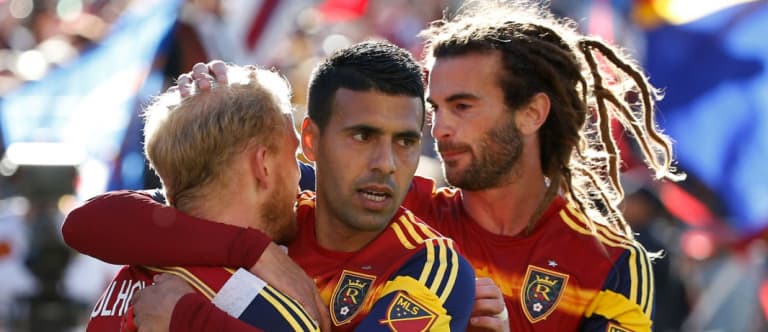
He won’t be alone, of course. Morales is still in town, though he’s out of contract this winter. Burrito’s shown game-breaking potential. Rimando isn’t going anywhere. Beltran is as solid as ever. GM Craig Waibel will bring in some new talent this offseason. Despite limping to their worst finish since 2007, Beckerman believes the Claret-and-Cobalt aren’t far away. A few moves here, a few tweaks there and the club – who have a CONCACAF Champions League quarterfinal date with Tigres in February – might just land right back where Mr. RSL thinks it belongs.
But this is about more than just next year for the 33-year-old Beckerman, who says he’s got “plenty left” in his legs. Utah is where he and his wife Kate plan on raising a family, where they plan on helping Real Salt Lake continue to grow. This place is home for Beckerman, and RSL is where he feels he belongs, regardless of how long he remains on the field.
“Real Salt Lake is… it’s a part of me. It’ll be a part of my life forever,” he says. “I didn’t have that feeling for Colorado, didn’t have that in Miami, but it really is here. I truly care about how it goes forward. When we lose I’m embarrassed, especially when it’s at home. If we don’t make the playoffs, I’m embarrassed.
“I want us to be in the bright lights, in positive light, at all times. It’s just a huge part of who I am, what my life will be, what my family is, this is part of us. I don’t see it in terms of five or 10 years – Real Salt Lake is going to be here in 50, 100 years. It matters what we do to it now, and it matters what the club is going to be going forward.”
